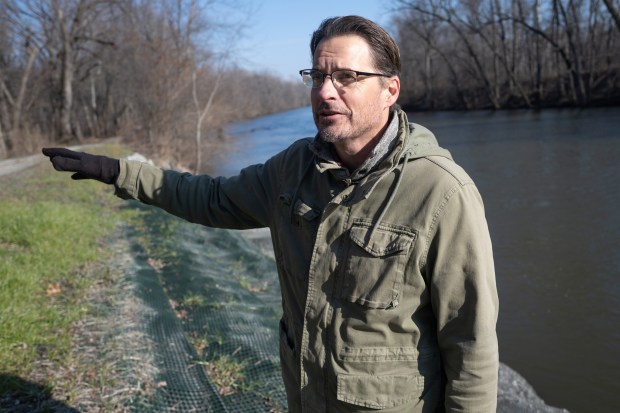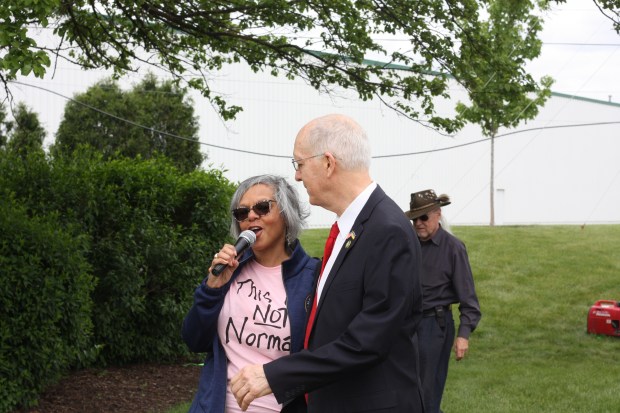Work will begin soon on removing a major source of logjams by U.S. 41 on the Kankakee River near Schneider.
About 30 narrowly spaced wooden supports from an abandoned Norfolk Southern Railroad bridge will be taken out, to below the mud line, thanks to an agreement worked out between U.S. Sen. Mike Braun’s office, the railroad and the Kankakee River Basin and Yellow River Basin Development Commission.
Scott Pelath, the commission’s executive director, said the bridge has been out of use long enough for trees 6 to 7 inches wide to grow through the bridge.
“There’s a section with antiquated wooden supports that are very closely spaced, and it catches every log that floats down that side of the channel,” Pelath said. “Because it takes up about one-third of the bridge span, you’re in effect reducing the width of the channel at that point.”
Removing those wooden supports will not only ease flooding concerns but also save the commission money. “They catch a ton of debris, and we usually end up having to clean it out three or four times a year,” he said.
Concrete supports will remain. The railroad might someday want to reuse that abandoned rail line, Pelath said.
Where the bridge crosses the Kankakee River, Schneider is on the north side and Sumava Resorts on the south side. Both communities have seen flooding in the past.
“Those human-made barriers absolutely have an impact on flood conditions,” Pelath said.
Flooding on the Kankakee River is a game of inches.
Executive director of the Kankakee River Basin and Yellow River Basin Development Commission Scott Pelath stands on an area of the Kankakee River on Tuesday, December 21, 2021. (Kyle Telechan for the Post-Tribune)
“Here’s the thing about the Kankakee,” Pelath said. “Inches of river height matter. Think about it. At Shelby, the difference between 11.5 feet and 12.5 feet is the difference between minor flood stage and major flood stage, just 1 foot.”
“Whenever you can remove those barriers and cut even a few inches worth of the water height, that can be the difference between a manageable flood event and having a breach somewhere,” he said.
“We’ve cleared out other bridges before that have had very substantial blockages and seen it, the logjam removal, show up in the U.S. Geological Survey gauges,” Pelath said.
He credited Braun’s office for moving quickly to reach the agreement with Norfolk Southern. Pelath was meeting with Braun’s regional director, Tony Ferraro, about the State Line Bridge, another logjam troublemaker, and mentioned this railroad bridge.
Days later, he was meeting with railroad officials.
“Obstructions at this bridge have posed a risk to Northwest Indiana for too long,” Braun said. “It’s remarkable what common-sense things we can accomplish just by bringing the right people to the table. This agreement will save Northwest Indiana dollars not just in regular river maintenance, but in future flood costs along the Kankakee.”
Under the agreement, work must be done before October, with the commission providing the funds and labor. That’s no problem, work will begin as soon as river conditions permit, Pelath said.
“Folks know we’ve had plenty of rain the past few weeks, and we’ll need things to dry out a little bit,” he said.
The contractor will cut through the rail lines and remove the wooden infrastructure down to below the mud on the river bottom.
Norfolk Southern handled the necessary approvals.
“The proposal to remove the bridge section made good sense for everyone,” said Derek Sublette, Norfolk Southern’s assistant vice president of government relations. “We understand the impact antiquated structures have on current needs. We also know that any future rail service at that location would require an updated bridge. When the senator’s office rang, we were glad to help.”
Doug Ross is a freelance reporter for the Post-Tribune.




